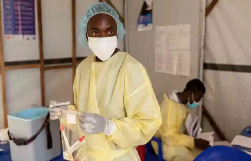The world was shaken by the impact of the COVID-19 pandemic. It was only after the virus weakened over time and vaccines were developed that people could breathe a sigh of relief. However, there are still several viruses that could potentially cause global havoc. Now, the world faces the threat of Mpox, previously known as Monkeypox. The World Health Organization (WHO) has declared Mpox a global health emergency.
Several cases of Mpox have been reported in 13 African countries, including Congo, resulting in 524 deaths so far. WHO Director-General Tedros Adhanom Ghebreyesus held a media briefing after the International Health Regulations (IHR) Emergency Committee meeting on the rising cases of Mpox. He mentioned that this is the second time in three years that Mpox has reached an emergency status.
What WHO Said
Tedros stated that WHO is working swiftly to address the outbreak of Mpox in Africa. He noted that last week, he announced the convening of an emergency committee under the International Health Regulations to assess the rising cases of Mpox in Congo and other African countries.
Concerning Spread
On Thursday, the committee held an emergency meeting and advised that the situation with Mpox is a public health emergency of international concern. Tedros accepted the committee’s advice and pointed out that a new cluster of Mpox cases has been detected in eastern Congo, spreading rapidly to neighboring countries that previously had no reports of Mpox. The potential for further spread within Africa and beyond is highly concerning.
Public Health Emergency Declared
Tedros emphasized that besides the outbreaks of other clades of Mpox in other parts of Africa, it is clear that a coordinated international response is crucial to prevent the spread and save lives. A public health emergency is the highest level of alert under international health laws. Following the committee’s advice and the African Centers for Disease Control and Prevention (CDC), a public health emergency was declared for regional security on Tuesday.
Urgent Response Needed
WHO is working on the ground through regional offices in affected countries and others at risk. It collaborates with partners like the Africa CDC, NGOs, and civil society. “For instance, we are providing machines to analyze blood samples and confirm Mpox cases; we are helping laboratories sequence viral samples; we are conducting case investigations and contact tracing, engaging in risk communication and community outreach; we are training healthcare workers and supporting clinicians to provide appropriate care; and we are facilitating access to vaccines for various countries.”
Steps to Prevent Infection
To finance this work, WHO has developed a regional response plan requiring an initial $15 million. Approximately $1.5 million has already been released from WHO’s Contingency Fund for Emergencies, with plans to release more funds in the coming days. Tedros stated that WHO is committed to coordinating a global response in the coming days and weeks, working closely with each affected country to prevent the spread, treat those infected, and save lives by leveraging its presence on the ground.
Over 14,000 Cases and 524 Deaths
Tedros expressed gratitude to the Emergency Committee for its work and advice, giving the floor to the committee’s chair, Professor Dimi Ogoina, to summarize the committee’s views. Mpox has been reported in Congo for over a decade, with the number of reported cases increasing each year. Last year saw a significant increase in reported cases, and the number of cases reported this year has already exceeded last year’s total, with over 14,000 cases and 524 deaths.
Clade IIb Spread Globally in 2022
A different form of the Mpox virus, Clade IIb, spread globally in 2022, primarily among men who have sex with men. WHO declared a public health emergency, with the outbreak lasting from July 2022 to May 2023, resulting in 140 deaths out of approximately 90,000 cases before it largely subsided.



